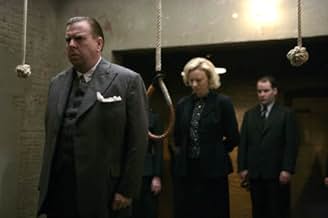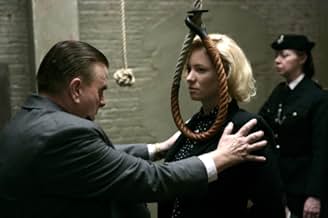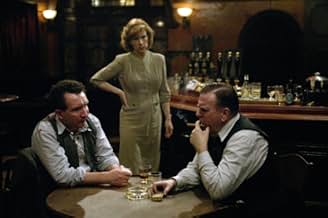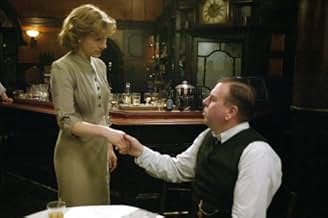VALUTAZIONE IMDb
7,4/10
5902
LA TUA VALUTAZIONE
Aggiungi una trama nella tua linguaThe life and times of Albert Pierrepoint - Britain's most prolific hangman.The life and times of Albert Pierrepoint - Britain's most prolific hangman.The life and times of Albert Pierrepoint - Britain's most prolific hangman.
- Nominato ai 1 BAFTA Award
- 2 vittorie e 4 candidature totali
Lizzie Hopley
- Dorothea Waddingham
- (as Elizabeth Hopley)
Recensioni in evidenza
I booked this independent little British film to show at Coalville's Century Theatre, on the Non-Theatrical circuit. Titled "Pierrepoint" here in the UK, this is a case of another quality British film being routinely ignored by the multiplexes in favour of the usual fodder presented for the masses. I was confident my regular audience would be interested by this true story of mass executioner Albert Pierrepont who really was 'a household name' in the 50s and 60s. In actual fact, Mr Pierrepoint was NOT 'the last hangman' in the UK. It really is a remarkably entertaining picture considering the obviously dour storyline, much aided by the portrayal of charismatic star Timothy Spall, who can be relied upon to always give an interesting and engrossing performance. Mr Spall is no matinée idol lead but not many would argue he is one of the most popular actors in Britain today. The film explains how Albert followed in the same 'career' of his father and Uncle Tom (who is briefly portrayed in the film), and interestingly reveals the technical side of his skillful and efficient methods for a successful result! Along the way, Albert is seen with Field Marshal Montgomery, who personally recommended Pierrepoint to carry out the Nuremburg executions, as well as other familiar people such as Timothy Evans, Derek Bentley and Ruth Ellis, all of whose cases fed the argument for the abolition of capital punishment. In the film, much dramatic use is made of Pierrepoint's execution of his friend, 'Tish', who often sang duets with Albert in the latter's pub. This really is true, very much a case of stranger than fiction. This film is strangely entertaining, never dull, although I noted some of the female members of my audience were regularly looking downwards whenever a hanging was shown. However, afterwards, there many favourable comments about this film and we were still talking about it at the post show drink in the pub afterwards! Obviously achieved on a very restricted budget, but a film to be recommended.
Albert Pierrepoint was Britain's most prolific executioner, overseeing the hanging of more than 600 condemned men and women including Derek Bentley, Ruth Ellis and Lord Haw Haw. Adrian Shergold's film starring Timothy Spall in the title role is a dark period piece exploring the stark relationship between compassion and work ethic.
Pierrepoint approaches his grisly duties with pride, professionalism and a stoical detachment a third generation hangman, he is well accustomed to checking his personal life at the prison gate while he gets on with the job at hand.
But duty and morality are constantly battling in the back of his mind - a struggle neatly illustrated when he is seconded to Germany after the War and tasked with dispatching Nazi war criminals. His clinical work here is deliberately and uncomfortably linked to the crimes of the Nazis who gassed their Holocaust victims with the same brutal precision.
Back in England, as liberalism begins to take hold and high-profile executions enrage a population bubbling with discontent, Pierrepoint's reputation in the eyes of the public slides swiftly and irretrievably from British war hero to callous murderer a bewildering descent perfectly captured by Spall's mesmerising performance. Juliet Stevenson is not bad either as Pierrepoint's loyal wife gradually embittered by years of turning the other cheek at her husband's double life.
The film celebrates dignity and humanity but is laced with a uniquely British attitude evocative of Vera Drake and The Remains of the Day. Like these earlier social dramas, Pierrepoint culminates memorably in a momentary quivering of its previously resolute stiff upper lip.
Pierrepoint approaches his grisly duties with pride, professionalism and a stoical detachment a third generation hangman, he is well accustomed to checking his personal life at the prison gate while he gets on with the job at hand.
But duty and morality are constantly battling in the back of his mind - a struggle neatly illustrated when he is seconded to Germany after the War and tasked with dispatching Nazi war criminals. His clinical work here is deliberately and uncomfortably linked to the crimes of the Nazis who gassed their Holocaust victims with the same brutal precision.
Back in England, as liberalism begins to take hold and high-profile executions enrage a population bubbling with discontent, Pierrepoint's reputation in the eyes of the public slides swiftly and irretrievably from British war hero to callous murderer a bewildering descent perfectly captured by Spall's mesmerising performance. Juliet Stevenson is not bad either as Pierrepoint's loyal wife gradually embittered by years of turning the other cheek at her husband's double life.
The film celebrates dignity and humanity but is laced with a uniquely British attitude evocative of Vera Drake and The Remains of the Day. Like these earlier social dramas, Pierrepoint culminates memorably in a momentary quivering of its previously resolute stiff upper lip.
I'd just been through a run of watching many poorly made, uninspiring and disappointing films in the last year, then luckily I saw this film Pierrepoint aka The Last Hangman which restored my faith in cinema.
Like all excellent films, it a simple story, expertly performed by a very strong cast. The other great element of a quality film is that it can be interpreted in many different ways by its viewers.
It shouldn't be explained as a portrayal of a man who hanged people although that is exactly what he did, what made him famous and what he will be remembered for.
For me Pierrepoint is more about working life. The job was always going to be a vocation as his father had been a hangman before him and he wanted to live up to a man he admired. We see the ends that he goes to, to be the best in his chosen field and I must admit I thought this was shown brilliantly; his care, his attention to the task, his desire to see the job done right. In the period of time that this story is set your job was something you took pride in not something you exploited to get better money and benefits while doing as little effort as possible.
It is impossible to be completely accurate when making a biographical film as you are condensing a persons lifetime into a couple of hours of screen time so therefore the director, writers, editor and producers need to shorten, edit and take a certain amount of artistic license.
Fortunately I knew nothing about Albert Pierrepoint before I watched this film so I didn't know what had been left in and left out of this account of his life, since then I talked to my father who knew many things about the man as he had lived and worked in London just after hanging was abolished and had seen Pierrepoint interviewed. He told me about a few things that weren't shown in the film, things that would have given my father an opinion about what type of person this famous hangman was. I've asked my father to see the film as I want to know how the celluloid depiction compares to his memories of the real man; even if he believes it to be inaccurate I'll still watch it again.
It is a dark, sad film which wouldn't be a great date movie but maybe a film you should watch the next time you have a bad day at work.
Like all excellent films, it a simple story, expertly performed by a very strong cast. The other great element of a quality film is that it can be interpreted in many different ways by its viewers.
It shouldn't be explained as a portrayal of a man who hanged people although that is exactly what he did, what made him famous and what he will be remembered for.
For me Pierrepoint is more about working life. The job was always going to be a vocation as his father had been a hangman before him and he wanted to live up to a man he admired. We see the ends that he goes to, to be the best in his chosen field and I must admit I thought this was shown brilliantly; his care, his attention to the task, his desire to see the job done right. In the period of time that this story is set your job was something you took pride in not something you exploited to get better money and benefits while doing as little effort as possible.
It is impossible to be completely accurate when making a biographical film as you are condensing a persons lifetime into a couple of hours of screen time so therefore the director, writers, editor and producers need to shorten, edit and take a certain amount of artistic license.
Fortunately I knew nothing about Albert Pierrepoint before I watched this film so I didn't know what had been left in and left out of this account of his life, since then I talked to my father who knew many things about the man as he had lived and worked in London just after hanging was abolished and had seen Pierrepoint interviewed. He told me about a few things that weren't shown in the film, things that would have given my father an opinion about what type of person this famous hangman was. I've asked my father to see the film as I want to know how the celluloid depiction compares to his memories of the real man; even if he believes it to be inaccurate I'll still watch it again.
It is a dark, sad film which wouldn't be a great date movie but maybe a film you should watch the next time you have a bad day at work.
When documenting a true story, criticism is often levied at the film-makers for condensing and twisting true-life events to suit their needs. That may well be the case. Unless the viewer has read first hand accounts of such true-life stories, then the film versions of these events appear stilted and fanciful.
Albert Pierrepoint's story has been well documented in not only his autobiography but by numerous historians and writers. With key events in the film being followed as closely as possible, it must have been nigh on impossible to keep everyone happy. Casting for this film must have been quite an exciting process. With people like Timothy Spall in the lead role, he showed all the care and attention that Pierrepoint was famous for. His wife, played by Juliet Stephenson, was a highly touching character. Although Mrs Pierrepoint never stood out in the original autobiography, Stephenson brings us a strong yet gentile woman, the driving force behind The Hangman. Eddie Marsan's portrayal as 'Tish' was casting at it's best.
A supporting cast of physically interesting character actors blended with superb lighting and set design, make a highly enjoyable and thought provoking film about the rights and wrongs of capital punishment.
The fact that the makers of 'The Last Hangman' managed to cram a fascinating life-long career into 90 minutes must serve as a tribute to their skill and craftsmanship.
Albert Pierrepoint's story has been well documented in not only his autobiography but by numerous historians and writers. With key events in the film being followed as closely as possible, it must have been nigh on impossible to keep everyone happy. Casting for this film must have been quite an exciting process. With people like Timothy Spall in the lead role, he showed all the care and attention that Pierrepoint was famous for. His wife, played by Juliet Stephenson, was a highly touching character. Although Mrs Pierrepoint never stood out in the original autobiography, Stephenson brings us a strong yet gentile woman, the driving force behind The Hangman. Eddie Marsan's portrayal as 'Tish' was casting at it's best.
A supporting cast of physically interesting character actors blended with superb lighting and set design, make a highly enjoyable and thought provoking film about the rights and wrongs of capital punishment.
The fact that the makers of 'The Last Hangman' managed to cram a fascinating life-long career into 90 minutes must serve as a tribute to their skill and craftsmanship.
I saw this DVD twice and read all the other user comments of this recent film before I considered I was ready to write my opinion on IMDb.com.
Capital punishment in the UK was abolished in 1965 and since then it has remained a controversial topic on which MPs have been given a free vote in the House (no whips office involved) and it has consistently been voted down by MPs ever since.The arguments for capital punishment range from "an eye for an eye"; why must the State keep killers alive at the public expense; as an example to other malefactors; to provide revenge for the bereaved families of the murder victim.I suppose the most controversial case cited for reimposing the death penalty stemmed from the Moors Murderers case from 1966, Ian Brady and Myra Hindley who died in custody.Even though they could not judicially be hanged, no Home Secretary since then has considered it politic to release or commute their sentence because of the expected public and media fury.Of course today in Britain killers are routinely sentenced "to life imprisonment" which depending on the circumstances, does not necessarily mean the killer's whole life.
Against this argument is the Christian doctrine of forgiveness and whether the State is executing an innocent man e.g.Timothy Evans (hanged by Pierrepont) instead of John Reginald Halliday Christie for the murder of Evans' baby daughter.
Albert Pierrepoint was certainly not "The Last Hangman" in the UK as I believe he resigned shortly after executing Ruth Ellis in 1955 after a continuous career as Chief hangman stretching from 1933 and as I said above. killers were hanged in the UK right up to 1964.In his 1974 auto- biography he turned against capital punishment with distaste as he considered it was merely the State exacting revenge and solved nothing.Considering he executed 608 murderers we must respect his opinions.I suspect those that advocate execution would not like to do the act personally as long as there is someone else to do it and bear the crushing guilt on their conscience.
Juliet Stevenson gives a marvellously understated performance as Anne Pierrepoint, Albert's wife and provides the home life and comfort to her husband.She is also the business brains in the marriage.We see the chilling, technical efficiency and speed which convinced the Allied powers in 1946 that a British hangman was the best for dispatching the many Nazi war criminals sentenced to death at Nuremburg.Albert was informed by the brigadier that the first batch to be hanged in a day was 13 with many more to come.Albert did not want to know what evil the condemned had done and tried to ensure he kept himself personally and professionally detached when performing his duties for the State.He even had a sense of compassion for the condemned by trying to complete the hanging in less time than his father's average of 13 seconds to reduce the fear and suffering in them.In one notable case he was done in 7 1/2 seconds.Likewise at Nuremburg he decided to hang the condemned female Belsen guards first with the youngest going first as she would be the most frightened.
To my knowledge this is the first film which accurately shows the technical method of hanging that was used in British prisons.It was ignorance by film producers of this that made their films unconvincing when showing a hanging scene as hangmen were advised to keep their methods entirely secret from the public.
All credit must go to Timothy Spall in the central pivotal role and the whole production team in evoking capital punishment in a Britain between 1932- 1955.
Capital punishment in the UK was abolished in 1965 and since then it has remained a controversial topic on which MPs have been given a free vote in the House (no whips office involved) and it has consistently been voted down by MPs ever since.The arguments for capital punishment range from "an eye for an eye"; why must the State keep killers alive at the public expense; as an example to other malefactors; to provide revenge for the bereaved families of the murder victim.I suppose the most controversial case cited for reimposing the death penalty stemmed from the Moors Murderers case from 1966, Ian Brady and Myra Hindley who died in custody.Even though they could not judicially be hanged, no Home Secretary since then has considered it politic to release or commute their sentence because of the expected public and media fury.Of course today in Britain killers are routinely sentenced "to life imprisonment" which depending on the circumstances, does not necessarily mean the killer's whole life.
Against this argument is the Christian doctrine of forgiveness and whether the State is executing an innocent man e.g.Timothy Evans (hanged by Pierrepont) instead of John Reginald Halliday Christie for the murder of Evans' baby daughter.
Albert Pierrepoint was certainly not "The Last Hangman" in the UK as I believe he resigned shortly after executing Ruth Ellis in 1955 after a continuous career as Chief hangman stretching from 1933 and as I said above. killers were hanged in the UK right up to 1964.In his 1974 auto- biography he turned against capital punishment with distaste as he considered it was merely the State exacting revenge and solved nothing.Considering he executed 608 murderers we must respect his opinions.I suspect those that advocate execution would not like to do the act personally as long as there is someone else to do it and bear the crushing guilt on their conscience.
Juliet Stevenson gives a marvellously understated performance as Anne Pierrepoint, Albert's wife and provides the home life and comfort to her husband.She is also the business brains in the marriage.We see the chilling, technical efficiency and speed which convinced the Allied powers in 1946 that a British hangman was the best for dispatching the many Nazi war criminals sentenced to death at Nuremburg.Albert was informed by the brigadier that the first batch to be hanged in a day was 13 with many more to come.Albert did not want to know what evil the condemned had done and tried to ensure he kept himself personally and professionally detached when performing his duties for the State.He even had a sense of compassion for the condemned by trying to complete the hanging in less time than his father's average of 13 seconds to reduce the fear and suffering in them.In one notable case he was done in 7 1/2 seconds.Likewise at Nuremburg he decided to hang the condemned female Belsen guards first with the youngest going first as she would be the most frightened.
To my knowledge this is the first film which accurately shows the technical method of hanging that was used in British prisons.It was ignorance by film producers of this that made their films unconvincing when showing a hanging scene as hangmen were advised to keep their methods entirely secret from the public.
All credit must go to Timothy Spall in the central pivotal role and the whole production team in evoking capital punishment in a Britain between 1932- 1955.
Lo sapevi?
- QuizDespite the title Pierrepoint was not Britain's last hangman. He retired in the mid 1950s, shortly after executing Ruth Ellis. Britain never had a "last hangman", as the last two executions before suspension of capital punishment were carried out in different cities at the same time. The last two people executed were both guilty of the murder of John West, so it was decided to carry out the sentence at the same time in Aug 1964. People were still being sentenced to death In November 1965.
- BlooperThe Hamelin war criminal hangings took place in an execution chamber at the end of a cell corridor within the old prison itself, not in an aircraft hangar. Pierrepoint described this very clearly in his memoirs.
- Citazioni
Albert Pierrepoint: I did a lot of jobs in Germany. More than were really good for me. Too many really. I get so bloody tired now...
- ConnessioniFeatured in Adolf Hitler: The Greatest Story Never Told (2013)
- Colonne sonoreMakin' Whoopee
Music by Walter Donaldson
Lyrics by Gus Kahn
Performed by Timothy Spall and Eddie Marsan
I più visti
Accedi per valutare e creare un elenco di titoli salvati per ottenere consigli personalizzati
- How long is Pierrepoint: The Last Hangman?Powered by Alexa
Dettagli
- Data di uscita
- Paesi di origine
- Lingua
- Celebre anche come
- Pierrepoint: The Last Hangman
- Luoghi delle riprese
- Aziende produttrici
- Vedi altri crediti dell’azienda su IMDbPro
Botteghino
- Lordo Stati Uniti e Canada
- 23.192 USD
- Fine settimana di apertura Stati Uniti e Canada
- 2028 USD
- 3 giu 2007
- Lordo in tutto il mondo
- 824.856 USD
- Tempo di esecuzione
- 1h 30min(90 min)
- Colore
- Mix di suoni
- Proporzioni
- 1.85 : 1
Contribuisci a questa pagina
Suggerisci una modifica o aggiungi i contenuti mancanti







































